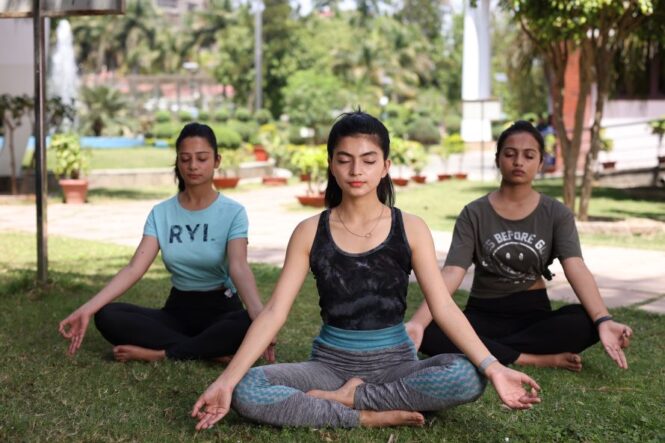This post was developed via a partnership with BetterHelp.
College is widely purported to be a transformative experience with a mix of fun and not-so-fun elements. While socializing, gaining new experiences, and other positive features of college can be highly enjoyable, class loads, studying, and networking can significantly increase college stress. One of the best ways to combat that stress and build your stress resilience overall is to adopt good self-care routines. This article will look at basic self-care strategies that college students may find helpful.
Self-care that works

Self-care, broadly defined, refers to any health-promoting behavior that contributes to mental and physical well-being. It’s important to note that many self-care behaviors are healthy in moderation but become unhealthy if used excessively.
For example, the occasional party might significantly lower stress and boost well-being, making it a good form of personal care. Partying so much that your studies and other obligations are affected is likely a way to avoid other responsibilities, making it a poor form of self-care.
Self-care consists of many activities that aren’t necessarily enjoyable to everybody. Avoiding procrastination, completing unpleasant activities, or making hard decisions are all forms of personal care, but many people don’t see them that way. Self-care isn’t necessarily fun, but it always contributes to your well-being. Don’t make the mistake of assuming that self-care only refers to things that bring joy, which could lead to adopting poor self-care behaviors that only work in the short term or not at all.
There are many self-care practices you can choose from, but some of those that are strongly supported by scientific evidence are listed below:
The big three

Not all self-care activities are created equally. While evidence-based self-care behaviors contribute to well-being, some have more of an impact than others. Experts sometimes refer to the “Big Three” self-care behaviors that form a foundation for more advanced self-care.
- Sleep. Sleep is incredibly important for physical and mental well-being. A lack of sleep can make concentration difficult and significantly impair your cognition. In addition, poor sleep quality or too little sleep can reduce the amount of energy you have for other forms of self-care.
- Diet. College requires a lot of energy. It’s important to eat regularly and ensure you get at least the minimum amount of calories your body requires each day. Similarly, overeating or eating unhealthy food is a common concern because it can produce short-term relief from stressors. Try your best to eat a healthy, balanced diet for most meals.
- Exercise. When it comes to dealing with stress, boosting self-esteem, and improving mood, it’s hard to find a more effective self-care activity than exercise. Exercise has both long and short-term benefits, meaning that a workout can improve your mood and lower stress immediately, and workouts sustained over time significantly enhance your overall well-being.
Positive social interactions
Many people enjoy the social options college has to over, but it can sometimes be challenging to balance a bustling social life alongside school obligations. Despite this, it’s important to try to engage in social activity, but not so much that it becomes a distraction or tool for procrastination. Evidence suggests that positive social interactions increase stress resilience, making it easier to manage the challenging aspects of college.
There are two big challenges associated with self-care through socialization. One, it’s important not to use parties, hangouts, or other social events to escape responsibilities. It’s easy to use social distractions as a tool for procrastination. Two, it’s important that the social interactions you seek are positive. The benefits come when interacting with friends who care about your well-being. Navigating cliques, climbing the social ladder, or competing socially might not provide the same advantages.
Organization

Keeping a tidy living space and workspace can significantly boost mental health. Staying organized can also help make tasks easier during heavy workloads. Many people overlook the important benefits of staying organized or may not realize just how helpful organization can be.
Staying organized is a great example of something that, on the surface, might not appear to be particularly effective self-care, but it helps enable mental well-being and makes it easier for you to complete tasks efficiently.
Affirmations
It’s important to stay positive during college. The workload can be demanding, and it can be easy to let self-doubt creep in. To combat this, you may want to consider introducing positive self-affirmations into your daily routine. Positive self-talk is associated with improvements in self-esteem and overall well-being. Pat yourself on the back when you do something well, and remind yourself how much effort it took to get there. Just as importantly, try to catch yourself if you have a habit of putting yourself down or speaking about yourself negatively.
Mindfulness and Meditation

Integrating mindfulness and meditation into your daily routine can be a powerful form of self-care for college students. Mindfulness involves being fully present and engaged in the moment, without judgment, which can help reduce stress and anxiety. Meditation, on the other hand, helps in cultivating a deep state of relaxation and a tranquil mind.
Together, these practices can enhance your focus, emotional regulation, and resilience to daily pressures. Starting with just a few minutes each day can lead to significant benefits, and there are numerous apps and campus resources that can guide beginners. Regular practice can create a buffer against the psychological stress often encountered in academic environments.
Technology Detox
In today’s digital age, college students are more connected than ever before, but this constant connectivity can also be a source of stress. Implementing a technology detox as part of your personal care routine can help mitigate the effects of screen fatigue and social media overload. Allocating specific times to unplug from digital devices encourages healthier sleep patterns, deeper connections with peers face-to-face, and a greater sense of overall well-being.
Whatever self-care routines you choose, it may be easier to form those routines into strong habits with the help of a therapist. A therapist or other mental health professional can help you adjust your self-care and get into the practice of adhering to self-care routines. For information about finding a good therapist, check out this article from BetterHelp, an online therapy platform.
 Imagup General Magazine 2024
Imagup General Magazine 2024



